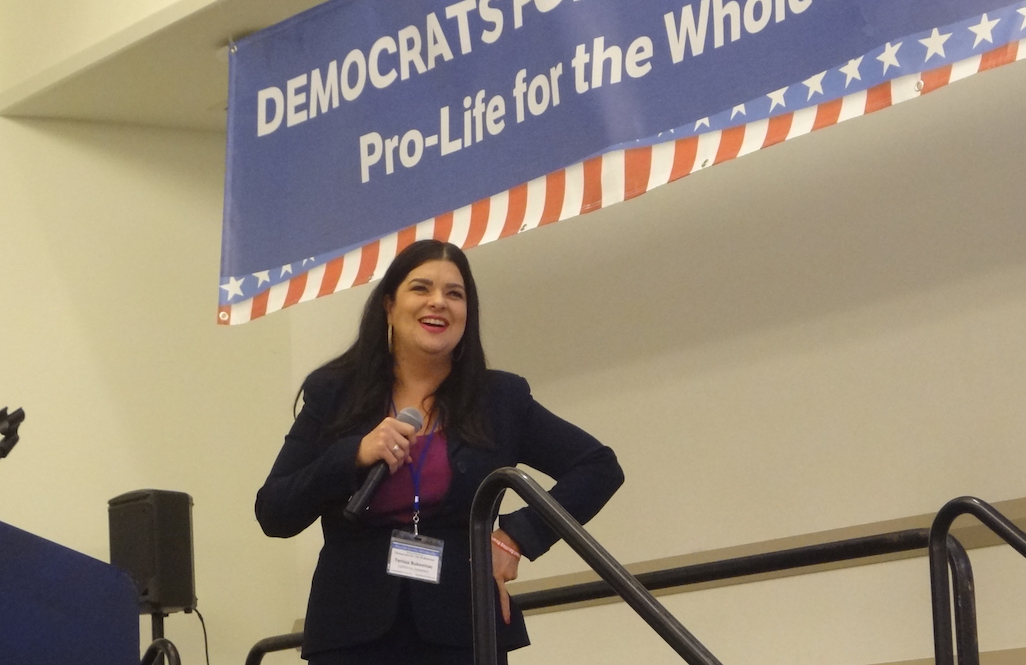
A billboard sponsored by Progress Michigan protests the presence of the Democrats for Life of America in East Lansing, Michigan, on July 27. Kristen Day, executive director of Democrats for Life of America, said she invited the group to learn more about pro-life Democrats and what they really believe. (Don Clemmer)
The party activists gathered in East Lansing for the national conference of the Democrats for Life of America got a hint at the obstacles they face even before their meeting. Less than half a mile from the convention center hosting the July 26-28 gathering, a billboard sponsored by Progress Michigan at a busy intersection implored, "Go home, Dems for Life!"
"On the national level, it's pretty scary," Kristen Day, executive director of Democrats for Life of America conceded, regarding the direction of her party among those who self-identify as pro-life. She added, "It may not feel like there's a lot of room at the top there, but from my perspective, I just see way more interest … and a lot more on the ground, at the grassroots level, of people unhappy with what the national level is doing on this issue."
Despite the conference's comprising just over 60 or so attendees, Democrats for Life of America reported that the conference produced three of four new state chapters for the organization, adding to about a dozen with good infrastructure and others in earlier stages. The Michigan chapter, which hosted the gathering, is itself relatively new.
The full Bernardin
The program for the conference unfolded under the banner of "Pro-Life for the Whole Life" and featured presentations on issues including the role of racism in abortion; accompaniment of women in crisis pregnancies; environmental degradation and health; immigration; physician-assisted suicide; and advance directives.
"Cardinal Bernardin was on the right track," said Robert Anderson, an elder law attorney and board member of Michigan Democrats for Life, referencing the range of issues addressed by the late Chicago Cardinal Joseph Bernardin, who first articulated the "seamless garment" consistent life ethic for Catholics.
"No matter whether you're talking about babies who are put in cages or babies who are in the womb, or elderly who are put at risk of being forced into euthanasia … we're talking about vulnerable people who are powerless and who are being taken advantage by more powerful people."
Catholics made up a strong majority of those in attendance, and speakers included immigration attorney and Adrian Dominican Sr. Attracta Kelly, who spoke of Pope Francis' call to reject a "throwaway culture" that fails to see the humanity of the other person.
"I never knew there were pro-life Democrats," Dana Anderson, branch director of immigration and refugee programs for Bethany Christian Services, observed at the end of her presentation. "This space is precious," she said, acknowledging the unique bridge that pro-life Democrats serve in the polarized political discourse of the United States.
Pro-life Democrats were not an exercise in imagination for Ashlen Sandoz, 22, a student at Nicholls State University in Thibodaux, Louisiana. As the summer intern for Rehumanize International, a secular, nonpartisan pro-life group dedicated to opposing all forms of aggressive violence, Sandoz could draw on the example of her governor, John Bel Edwards, and state Rep. Katrina Jackson, who are Democrats. Jackson was honored at the conference in East Lansing.
"Pro-life Democrats are definitely like a big thing in Louisiana, and I am really grateful for that," said Sandoz, a Catholic.
"I believe he is the future, because he's a whole-life advocate," Day said of Edwards. "He signed Medicaid expansion into law. He supports a living wage for families."
Advertisement
The case for engagement
Edwards also signed an early-term abortion ban into law around the same time that states like Alabama and Georgia were passing their own bans, a reminder that pro-life Democrats, when it comes to abortion, aren't about only support for women in crisis pregnancies but do, in fact, support legal protections for the unborn. It's a fact that brings to the fore the conflict pro-life Democrats have with a national party that has struggled in recent years to accept even the "personally pro-life/politically pro-choice" position on the issue.
"We want to work with our party. And we would like to see abortion gone completely, because we believe it hurts women and ends lives," said Day. She cautioned against an extreme posture on abortion leading the party to abandon the solidarity of helping women choose life, like what happened in Michigan with cuts to a program called Real Alternatives.
Kenneth Darga, president of the Michigan chapter of Democrats for Life of America, said the two sides of the debate should be united in addressing obstacles people face in wanting to choose life.
"There is no need to look for unworthy motives that dehumanize them and build walls of misunderstanding between us. We should all care deeply about the problems women face in a crisis pregnancy," he said in remarks to the conference. "People who are pro-life care about lives that are cut short prematurely, whether that involves a policeman's bullet or a doctor's knife."
Darga also noted the importance of continuing to show up for party meetings, forging relationships at the local level that can support more robust dialogue. Several talks echoed how often in policy debates it is assumed more distance exists between sides of various fronts of the life debate than is actually the case.
Wendi Enright, a conference attendee from Albany, New York, noted that her work in media and academia through the years has often made her the lone pro-lifer in the room.
"When I tell people that I'm also anti-death penalty, that's when I can sit down and have a conversation with them," she said. "They are tired of hearing people advocating for birth but not taking care of the life."

Terrisa Bukovinac of Pro-Life San Francisco addresses the national conference of the Democrats for Life of America in East Lansing, Michigan, July 27. Bukovinac, a millennial atheist, feminist and registered Democrat, argued that the pro-life movement must reach people in her demographic to achieve its goals in the future. (Don Clemmer)
A choice of futures
As much of the discussion at the conference dealt, implicitly or explicitly, with the future of the pro-life movement, Terrisa Bukovinac, founder and executive director of Pro-Life San Francisco provided one example as a leftist, feminist, atheist millennial (and vegan at that) who subscribes to the consistent life ethic. Noting the lack of millennials in the room, she encouraged pro-lifers to reach this left-leaning generation that is still surprisingly pro-life.
"They want a world that the Democrats are painting, but they do harbor these pro-life opinions. And it's up to us to show that we're not centrists. This has to be a progressive movement!"
She encouraged cultivating voices within the movement that don't correspond to the old stereotypes.
Sandoz, of Rehumanize International, one of the youngest people in the room, agreed that her Catholic faith doesn't come into play with the science or philosophy of why the unborn should have human rights, that atheists and others can share this view. However, she said, faith drives her to get involved.
"I think I have a responsibility to other human beings. I think that comes more from my faith," she said.
Aimee Murphy, Rehumanize International's executive director, who was also in attendance, said her group could relate to pro-life Democrats in their awkward relationship to the political status quo, not really fitting in anywhere.
"I see Democrats for Life as being the most authentically true to the principles of human rights and human dignity, because they are embracing all humans and not leaving some humans out," she said. "We are saying everyone needs to be more consistent. So we exist in the liminal space, and it's hard, but I think it's worth doing, because it's the right thing," she said of Rehumanize International's activism.
On many in the pro-life movement's alliance with President Donald Trump in the name of judicial appointments and other policy goals, Murphy urged caution, citing how some have also begun to offer vocal support for Trump's immigration policy, "insinuating that the separation of families, that the deaths of preborn children in miscarriages in detention centers is acceptable losses." She added, "Functionally, we're doing evil in order that good may come of it, which is consequentialist. It's contrary to human dignity. It's contrary to Catholic belief."
Anderson of the Michigan pro-life Democrats concurred that an alliance with Trump would ultimately prove Faustian and fruitless: "No matter how many justices, even if you get rid of Roe v. Wade, abortion will not stop."
Bukovinac noted that, despite pressure in pro-life feminist and consistent-life-ethic circles to remain independent, she is a registered Democrat because "I think it is very important for people who meet me to understand that I'm a left-leaning voter." She added, "An independent sounds like somebody without any political power."
[Don Clemmer is a journalist, communications professional and former staffer of the U.S. Conference of Catholic Bishops. He writes from Indiana. Follow him on Twitter: @clemmer_don.]







